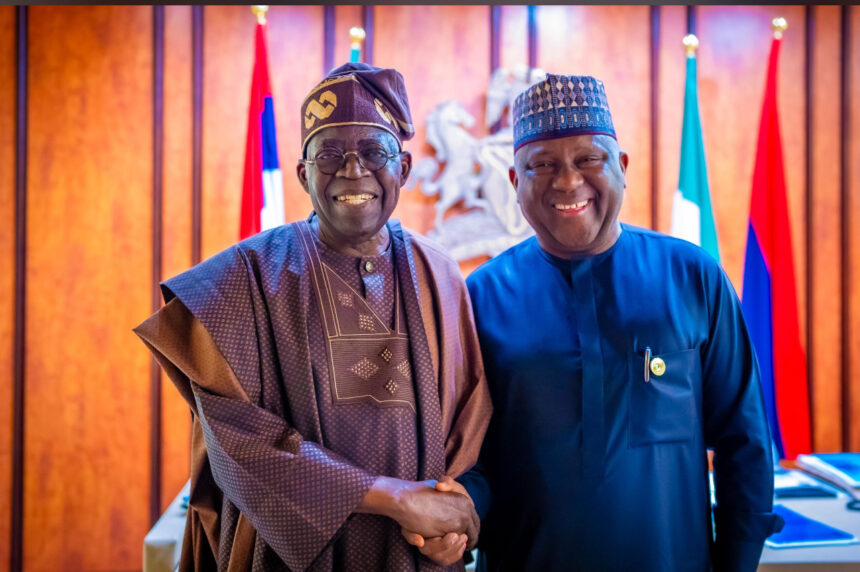*BUA Boss Crashes Rice Prices, Offers Lifeline To Millions Of Nigerians
Alhaji Abdulsamad Rabiu, the billionaire magnate and philanthropic force behind BUA Group, following a meeting with President Bola Ahmed Tinubu, at the Presidential Villa in Abuja, has vowed to crash the cost of rice, a staple no less sacred than salt in the Nigerian kitchen. His message to Nigerians is a benediction: hope is coming, and it tastes like home.
This is not the first time Rabiu has rewritten the narrative of suffering in Nigeria’s markets. Nor is it the first time BUA Group has acted as an economic powerhouse and moral compass in a nation frequently staggered by profiteering and policy paralysis. From rice to cement, from sugar to pasta, the empire Rabiu has built surpasses soulless accumulation of wealth, it espouses profit with a human face.
And in this newest crusade against food insecurity, BUA’s resolve may very well feed the stomach and stir the spirit of an entire nation. Rice, the golden grain of survival, once sold at a soul-crushing ₦110,000 for a 50kg bag, now falls to nearly ₦60,000. And it wasn’t magic that made it happen. It was vision, backed by execution. It was Abdulsamad Rabiu, chairman of BUA Group—billionaire industrialist, quiet revolutionary, and one of Nigeria’s most humane capitalists—who walked the talk from the policy room to the warehouse, from a meeting with President Bola Ahmed Tinubu to the milling floors of BUA’s rice factories.
At a time when many sit on the sidelines, hedging their investments against instability, Rabiu stepped forward with compassion and conviction, shattering the economics of scarcity and dealing a blow to hoarders who had turned hunger into an industry.
What Rabiu and BUA Group have engineered is not merely a market intervention. It is a moral correction. In a country of over 250 million people, where rice is not just food but a daily currency of survival, Rabiu’s vow to crash the price of the staple grain is nothing short of revolutionary.
For too long, cartels had exploited harvest seasons, buying up paddy rice and stockpiling it until scarcity bloated prices. They had turned food insecurity into a venture capital model, one built on the hunger of the masses.
But the President’s waiver—six months of eased restrictions on food imports—lit the first flame of disruption. And it was Rabiu, not a bureaucrat, who turned that flame into a firestorm of relief. Working in sync with fellow industrialist Aliko Dangote, he flooded the market with real commodities. He brought evidence, not excuses: rice, flour, maize—all crashing in price.
President Tinubu had made a decisive move, but it needed carriers; captains of industry who wouldn’t wait for applause to act. Rabiu responded like a statesman in private-sector clothing. He didn’t come to Aso Rock to only thank the President, he came bearing results.
And his reward? Not fanfare. But the satisfaction of turning suffering into solvency; of proving that compassion can coexist with capitalism.
Starving the Cartels, Feeding the Nation
Before Rabiu’s intervention, the economics of hoarding were straightforward: buy low at harvest, wait out the lean months, then sell at predatory rates. The farmer didn’t profit. The consumer suffered. Only the middleman, the silent predator in the shadows, smiled to the bank.
BUA’s counter-strategy was simple: flood the supply chain, break the artificial scarcity, and let the power of volume replace the tyranny of manipulation. Today, those same hoarders are bleeding cash. Their cartel has collapsed under the weight of BUA’s humane efficiency.
This is not just good business. It is good nationhood. As Rabiu himself said, “We also have 250 million Nigerians paying more than they should, because of what a few individuals are doing.” His rebuttal to that injustice was not a tweet or a press release. It was action at industrial scale.
Yet Rabiu’s intervention did not end in the marketplace. He moved from food to foundation, literally. In an economy battered by FX volatility, soaring gas prices, and weakened infrastructure, Rabiu made another bold gesture: BUA Cement, alongside Dangote Cement and others, agreed to freeze cement prices—but specifically for contractors working on public projects under the Renewed Hope initiative.
Why does that matter? Because cement is not just a product. It is a nation-building material. Roads, schools, hospitals—they are not built on ambition alone. They are built on affordability. And by freezing prices, Rabiu and others didn’t just help government contractors—they bought Nigeria time, fiscal space, and infrastructural momentum.
This isn’t charity. This is strategic compassion, and it’s the kind that multiplies returns across generations.
The Cement Technology Institute
The story of Rabiu’s compassionate capitalism deepens beyond price tags and policy alignments. In a country where much discourse on economic growth skirts the edges of real skill acquisition, Rabiu and Dangote are making a profound wager on human capacity itself.
Together, they are breathing new life into the Cement Technology Institute of Nigeria, pledging an astonishing N20 billion annually to train artisans, the very lifeblood of Nigeria’s construction industry. This is no mere token investment. It is an acknowledgment that infrastructure is more than bricks and mortar; it is the hands, minds, and talents of Nigerians empowered to build, innovate, and sustain.
For a nation still grappling with stalled roads and collapsing buildings, the reverberations of this investment will be felt in every corner, every village, every bustling city skyline yet to rise.
A New Model of Nationhood: Economic Patriotism in Action
President Bola Tinubu, in that quiet meeting with Rabiu, did more than commend private sector efforts; he coined a phrase for the moment: “economic patriotism.” This was a recognition that Nigeria’s salvation will not arrive from foreign coffers or empty promises but from those who dare to bet on the nation amid uncertainty.
Rabiu, Dangote, and a rare few have chosen to play a different game. While many watch, waiting for political stability or more favorable conditions, these industrialists create stability by their very actions. They build, invest, and innovate—not as spectators, but as committed players on Nigeria’s field.
This economic patriotism is the heartbeat of transformation. It is the quiet refusal to let despair dictate the future. It is the tangible demonstration that private enterprise, infused with a sense of national duty, can be a greater force for change than policy alone.
Humanised Capitalism at Its Finest
To call Abdulsamad Rabiu a mere billionaire is to miss the story altogether. His journey, his ethos, and his business practice embody what Nigeria so desperately needs: capitalism with a human face.
Rabiu’s approach transcends profit margins. It marries business acumen with compassion. It understands that behind every bag of rice is a mother feeding her family, a child going to school, a trader earning a livelihood. His charitable gestures and enduring commitment to social good are not mere side projects—they are central pillars of his corporate philosophy.
This humane capitalism fosters remarkable and boundless growth, not just in factories and warehouses, but in communities and individual lives. It offers a template for how Nigerian enterprise can lift the entire nation, cultivating prosperity that is shared, sustainable, and deeply rooted in empathy.
What Abdulsamad Rabiu and BUA Group have done is nothing short of a quiet revolution. They have disrupted hoarding cartels, crashed exploitative prices, and realigned business with national interest. They have stepped into the breach where policy alone cannot reach.
This is more than a market correction. It is a signal that the tide is turning, a proof that Nigeria’s future will be built by bold, compassionate actions from within. Rabiu’s recent vow to crash rice prices, backed by real industrial muscle and moral clarity, offers millions of Nigerians not just affordable food, but dignity. His partnership with government initiatives reveals a new paradigm: where private sector power and public purpose converge.




